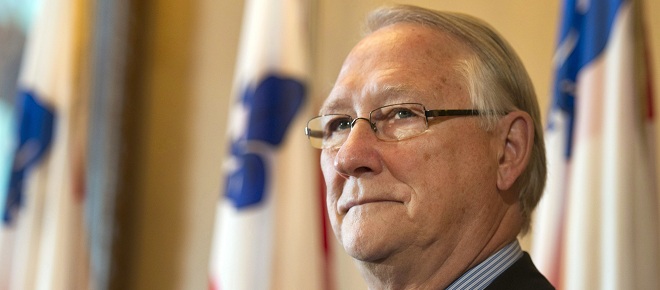Tremblay’s career meets an ignoble end
Martin Patriquin on the resignation of Montreal’s mayor
CP/Ryan Remiorz
Share

So adios, then, Mayor Gérald Tremblay.
After weeks of intense pressure, fueled by the odour emanating out of the so-called Charbonneau Commission looking into corruption in Quebec’s construction industry, the former perfumist has decided to call it quits.
“I always advocated the values of integrity, honesty and respect,” he said in a hastily called press conference Monday evening, adding that he was living through an “insupportable injustice” and that “one day, justice will be rendered.”
It’s an ignoble end of an 11-year career. In taking an apparently self-imposed four-day exile to reflect on his next move, Tremblay basically pulled the same stunt as Laval’s Gilles Vaillancourt—that other long-serving Quebec mayor teetering on edge thanks to widespread allegations of corruption, graft and rampant favouritism. If three is a trend, then how about Richard Marcotte, mayor of the north shore town of Mascouche, who is awaiting trial on fraud and corruption-related charges? And to think Rob Ford has problems, what with his measly little city bus that he might have borrowed to ferry around his high school football team. Can you say bush league?
In truth, that Tremblay lasted so long is a tribute to the man’s ability to project just the right amount of ignorance and outrage at ever-mounting pile of evidence that much of his administration was a beneficiary and a supplicant to Montreal’s Mafia. About three years ago, I wrote about Tremblay’s strange ability to at once present himself as a staunch fighter of corruption while saying he is clueless that it might be going on in his own cabinet. He told reporters about the time he denied a certain mobbed-up type of a liquor licence, and how that gentleman was later found dead in the trunk of his car. Ah, so what about the fact Frank Zampino, Tremblay’s second-in-command, cooked up a sweetheart deal that saw a parcel of city land go to a developer for peanuts? Tremblay’s answer came in the form of a radio advert, played throughout 2009’s municipal campaign. “One of your colleagues at work decides to do something a little shady,” Tremblay said in a voiceover. “Do you think they’re going to tell their boss or you? Face it: they’re not going to tell anybody.”
Tremblay’s repeated his schtick throughout his time as mayor, and it got him through the water metre crisis—a tender-free contract cobbled together by Zampino and involving allegedly mobbed-up construction magnate Tony Accurso that nearly cost Montreal taxpayers $356 million; a price-fixing scheme that saw the so-called “fabulous 14” cartel of construction companies colluding to split municipal contracts, at great added expense; the news that Bernard Trepanier, Union Montreal’s chief financier, earned the name “Mr. Three Per Cent” for allegedly taking that percentage in exchange for city contracts; and a wire-tapping scandal in which the city was found to have hacked the email of Jacques Bergeron, Montreal’s auditor general.
There’s a longer story of how Tremblay got away with it, having to do with Quebec’s, er, unique political culture. Tremblay is a federalist, and as dirty as his administration might have been, Montrealers apparently couldn’t bring themselves to vote for the alternative, Louise Harel, a sovereignist so convinced of the cause that she proudly didn’t learn English in university. Mostly, though, I think even those Montrealers who actually voted for Tremblay—turnout was 38 per cent, so it wasn’t very many—did so out of apathy. To his credit, Tremblay did a remarkable job of selling himself as a well-meaning, inoffensive, somewhat goofy technocrat whose capacity for surprise (see Frank Zampino) was about equal to his capacity for outrage (see Tremblay’s reaction to La Presse, whenever it reported another of his administration’s cock-ups.) In a way, he was the anti-Vaillancourt. While everyone (or at least 75 per cent of Laval residents, according to a recent poll) thought that mayor was crooked, Montrealers honestly seemed to believe Tremblay really was as clueless as he sold himself.
All this came to a crashing halt with the Charbonneau Commission. During the whirlwind last month, the commission heard from four witnesses who put meat on the bones of these allegations. One-time fledgling construction magnate Lino Zambito testified that, indeed, three per cent of the bribes he paid to the Mafia for the honour of bidding on contracts went to Union Montreal. Former Union Montreal political organizer Martin Dumont went further, saying Tremblay knew about the bribes—something Tremblay specifically denied, quite vehemently, in his resignation speech tonight. Finally, two senior city engineers testified how they for years took bribes from, among others, Nick Rizzuto in exchange for a bit of creative accounting on city contracts. This last bit—that city workers themselves, not just Tremblay’s Union Montréal party, were on the take—was nearly too much to bear for Montrealers. Things really tipped over when, in a freakishly bad bit of timing, Tremblay introduced a budget with an increase of, yes, 3.3 per cent in taxes.
His voice trembling but his sense of surprised outrage still very much intact, Tremblay faulted his own tendency to trust others for his downfall. “I delegated responsibility, I had confidence in my elected members and the civil service. I should have had doubts, I should have asked questions. Unfortunately it was only after the fact that they gave me the documents and notes. When I got these, I asked, ‘Why didn’t you inform me? Why didn’t anyone in a position of authority do anything with this information?'”
He might have been talking to a mirror.